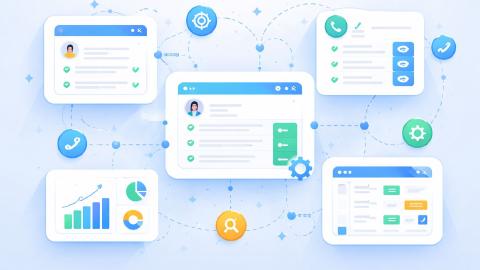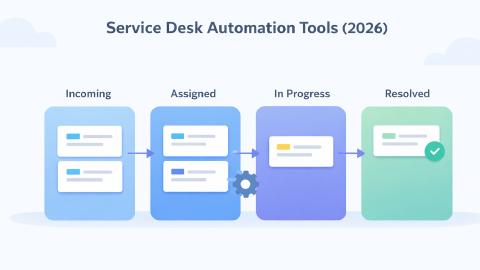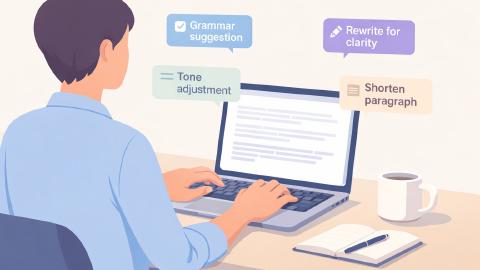12 Best AI Research Assistants Every Student Needs in 2026
Boost your research and essay writing with these top AI research assistants for students in 2026.
Writing papers and doing research is one of the most time-consuming parts of being a student. It’s easy to get stuck when you don’t know where to start, what sources to use, or how to structure your ideas.
An AI research assistant can help with all of that. These tools are built to speed up research, organize your notes, and even help you write better essays.
If research and writing are stressing you out, this guide will show you some useful tools that can make things easier.
In this article, we'll list out the 12 best AI research assistants every student should use in 2026. Let's dive in!
What is an AI Research Assistant?
An AI research assistant is a tool that helps students find, understand, and organize academic content faster. It uses artificial intelligence to simplify how you do research, summarize sources, and even write essays.
Instead of manually searching through dozens of articles or struggling to outline your essay, an AI research assistant helps you speed up the process. These tools are made to take the boring or confusing parts of research and make them more manageable.
Overall, AI tools for research save time and help students focus on understanding and improving their work.
What Does an AI Research Assistant Do?
An AI research assistant helps students handle different parts of the research and writing process. It’s designed to speed things up and make complex tasks easier to manage.
Here are a few things an AI research assistant can help you do:
Find Reliable Sources - It can search for academic papers and articles that match your topic.
Generate Citations and Annotations - It helps generate citations and adds notes to help explain the sources.
Write Essays and Papers - It supports writing essays, rewriting them, and organizing content for assignments. It can even grade your essay and give you feedback!
Come Up With Ideas for Topics - It can suggest research questions or paper ideas when you don’t know where to start.
Summarize Articles - It breaks down long or complex texts into short, easy-to-read summaries.
These tools don’t replace your own work—they support it. You still make the decisions, but the assistant helps you get there faster.
Use AI Blaze to streamline your research for FREE.
Can AI Actually Help With Research?
AI can actually be very helpful when doing research! It saves time by quickly finding sources, summarizing them, and helping you decide which ones are useful.
AI research tools don’t just pull random info—they organize and explain it in ways that are easier to understand. Many students use them to break down complex readings or gather facts for essays.
So if research feels overwhelming, using an AI research assistant is a smart way to stay organized and save time.
Best AI Research Assistants
There are a lot of AI tools out there, but not all of them are helpful for research and writing. The tools below were picked because they actually support the way students work—whether that's finding sources, taking notes, or writing papers.
Here’s a breakdown of 12 AI research assistants that can help make schoolwork easier and less stressful.
1. AI Blaze
First up on our list of the best AI research assistants is AI Blaze.
AI Blaze is your personal AI research and studying assistant that helps you quickly generate citations, summarize text, articles, and PDFs, and streamline the writing process!
With AI Blaze, you can answer questions and generate summaries on any website (no file uploading necessary)!
Features
Generate notes and summaries with AI - AI Blaze helps you summarize PDFs & articles and take notes using AI!
Generate citations for any source - AI Blaze helps you create citations and annotations for your paper/essay.
Improve your writing with AI - AI Blaze can generate text for you and help you rewrite your essay/paper to improve it and your writing.
AI Blaze works on any website! - Get help with homework on any website on Chrome.
AI Blaze is free! - Forget about annoying licenses or subscriptions. AI Blaze is free for students!
Use AI Blaze to streamline your research for FREE.
2. Unriddle AI (Anara)
Unriddle AI, now rebranded as Anara, focuses on helping students digest long or complex academic readings.
It can summarize sections of research papers and provide explanations in plain language. Students can ask follow-up questions about confusing parts and generate notes or flashcards from the content.
Tools like Unriddle are a good fit for anyone dealing with dense material they need to understand quickly.
3. Elicit AI
Elicit AI is designed to help students search academic databases and extract useful information.
It finds research papers based on your question and shows summaries and key insights from each one. Instead of reading every paper in full, students can compare findings side by side to decide what to use.
It’s helpful for building arguments or gathering evidence for an essay.
4. Coral AI
Coral AI is a research organization tool that helps students link their ideas to sources and track progress over time.
It allows users to group notes, tag themes, and visualize how research connects to their final paper. This structure is useful for managing big projects or keeping thoughts organized while researching different angles of a topic.
Coral also helps students avoid losing track of important ideas or citations.
5. Consensus AI
Consensus AI answers research questions by pulling information directly from peer-reviewed studies.
It summarizes what the academic community has said about a topic and links to the original sources. This makes it easier for students to find credible information and include evidence in their writing.
It's especially helpful when you need trustworthy answers without digging through dozens of papers.
6. AlphaSense
AlphaSense is more commonly used in business and finance, but students researching markets, companies, or economic trends can also benefit from it.
It pulls insights from earnings calls, reports, and financial news, showing relevant points quickly. Students can use it to support case studies or find real-world data for business writing.
It’s a practical tool for assignments that require industry-specific research.
Use AI Blaze to streamline your research for FREE.
7. Litmaps
Litmaps helps students visualize the relationship between academic papers.
It starts with one study and shows related work through citation networks, helping students see how research connects. This tool is useful for building a literature review or exploring a new topic from multiple angles.
It can also help identify gaps or new directions for further study.
8. SciSpace AI
SciSpace AI simplifies technical and scientific papers by explaining key sections in easier terms.
Students can upload PDFs, ask questions about specific parts, and get explanations they can actually understand. This is especially helpful for STEM assignments where complex equations or dense writing can slow you down.
Sites like SciSpace are good options if you need to conduct literature reviews or find sources.
9. Perplexity AI
Perplexity AI functions like a search engine, but it gives cited answers pulled from reputable sources.
Students use it to get background information, clarify topics, or find key points without browsing dozens of links. Each result includes clickable references, which helps with fact-checking or deeper research.
It’s useful for quick research sessions or early stages of essay planning.
10. Scite AI
Scite AI shows how a research paper has been cited by others—whether the citation supports or challenges the original work.
This gives students a clearer picture of how reliable or influential a source is. It also helps compare different viewpoints within academic debates.
Scite is useful when you're deciding which sources to include or need to show balanced perspectives in your paper.
11. Research Rabbit
Research Rabbit is a tool for exploring academic papers through visual networks of authors and citations.
Students can follow the paths between related studies and track how ideas evolve across the field. It’s especially helpful for discovering lesser-known but relevant sources.
The tool also lets users build and organize collections for ongoing research projects.
Use AI Blaze to streamline your research for FREE.
12. Jenni AI
Jenni AI assists students in writing and editing their papers by suggesting ways to continue a sentence or improve clarity.
Tools like Jenni AI help with structuring paragraphs and refining arguments without completely rewriting them for you. Students can also use its citation and grammar support while drafting.
It’s useful for keeping the writing process moving when you get stuck.
10 Useful AI Prompts for Research
Using the right prompts can make your AI research assistant more effective. These prompts are designed to give clear instructions so the AI can return better, more relevant results.
The more specific you are, the more helpful the response will be. Use detailed prompts to improve your research!
Here are 10 prompts you can copy to get started with using AI for research:
Summarize the main arguments and findings in this article in 3 bullet points.
List 5 peer-reviewed sources from the last 5 years about climate change and public policy.
Explain the key ideas in this paragraph in simpler terms so a high school student could understand it.
Compare the pros and cons of remote learning based on recent academic studies.
Create a detailed outline for a 1,000-word essay about the effects of social media on mental health.
Rewrite this paragraph to improve clarity and flow, while keeping the original meaning.
Suggest two counterarguments I should address in a persuasive essay about banning plastic bags.
Find three academic studies published after 2020 that discuss the economic impact of automation.
Turn these bullet point notes into a short summary paragraph for my paper's introduction.
Based on the topic of fast fashion, suggest a clear and specific thesis statement for an argumentative essay.
These prompts work best when you're clear about what you want. Try to include a topic, goal, and any specific format you need.
Make Research Less Stressful
Doing research and writing essays doesn’t have to feel overwhelming. Using the right AI research assistant can save time, improve your writing, and make studying a little easier.
Try a few of the tools from this list and see which one fits your workflow. The more you use them, the more efficient your study sessions will be.
You don’t need to do it all alone—let tech do the boring stuff so you can focus on learning.
To recap, our pick for the best AI research assistant is AI Blaze: your personal AI research, studying, and writing assistant! AI Blaze is free and works on any website, making it the #1 AI research assistant on our list.




